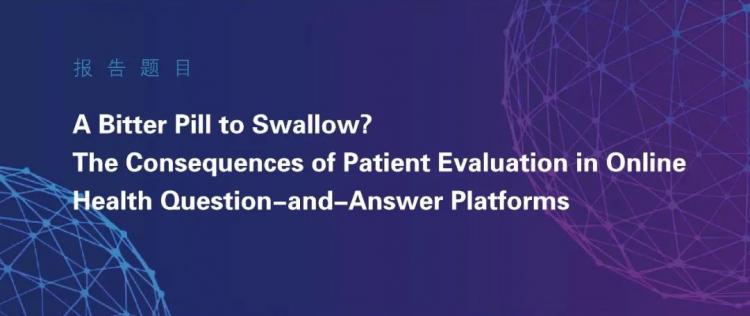讲座预告 | 使用先进的机器学习算法来解密在线问诊平台中患者的决策行为


报告人
陈琛助理教授
举办人
闵庆飞 教授
报告时间
2022年9月21日 18:30-20:30
会议号
腾讯会议867-174-025
报告题目
A Bitter Pill to Swallow? The Consequences of Patient Evaluation in Online Health Question-and-Answer Platforms(使用先进的机器学习算法来解密在线问诊平台中患者的决策行为)
报告内容和摘要
Online health question-and-answer (Q&A) platforms (OHQPs), where patients post health-related questions, evaluate advice from multiple doctors, and direct a bounty (monetary reward) to their most preferred answer, have become a prominent channel for patients to receive medical advice in China. To explore the quality of medical advice on these platforms, we analyzed data on patients’ evaluation of ∼497,000 answers to ∼114,000 questions on one of the most popular OHQPs, 120ask.com, over a three-month period. We assembled a panel of independent physicians and instructed them to evaluate the quality of ∼13,000 answers. We found that the quality of medical advice offered on the platform was high on average, and that low-quality answers were rare (6%). However, our results also indicate that patients lacked the ability to discriminate advice quality. They were as likely to choose the best answer as the worst. The medical accuracy of patient evaluation was worse in critical categories (cancer, internal medicine) and for vulnerable subpopulations (pediatrics). Given that millions of patients seek medical advice from OHQPs in China annually, the social and economic implications of this finding are troubling. To understand how patients evaluate advice, we trained deep neural networks to think like patients, allowing us to identify patients’ positive and negative responses to different heurist cues. Although our results indicate that OHQPs perform well, we identified several concerns that should be addressed through platform design and policy changes. Because the Q&A process lacks peer review mechanisms, signals of advice quality are not conveyed to patients, forcing them to rely on heuristic cues, which cannot effectively guide them toward the best advice. We also found that the platform reputation metric was not correlated with the quality of the advice giver’s advice, may effectively encourage patients to select lesser quality medical advice, and increased the risk of moral hazard for malicious players to intentionally provide less accurate but more agreeable advice for personal gain. Our analysis revealed bad actors on the platform, including drug promoters and spammers. Finally, we found that OHQPs exacerbated care avoidance. We discuss several potential policy changes to address these shortcomings.
报告人简介
Dr. Chen Chen is an Assistant Professor of Information Systems at The Chinese University of Hong Kong, Shenzhen. He obtained his Ph.D. in Molecular Cancer Biology from Duke University in 2014 and Ph.D. in Management from Boston University in 2020. Prior to that, he earned a Bachelor’s degree from Tsinghua University, China. His primary research interests include 1) using advanced deep learning algorithms and language models to decipher how human beings interact, behave and make decisions in both virtual and real communities; 2) understanding the dynamics of patient-doctor\'s interaction on online healthcare platforms; 3) knowledge engineering and knowledge interpolation/extrapolation vis knowledge graph and Graph Neural Networks. Dr. Chen has published at Information Systems Research (UTD24), Nature Cell Biology, etc.
来源 | 信息系统与商业分析研究所
撰稿 | 闵庆飞
编辑 | 台怡
(本文转载自大连理工大学经济管理学院 ,如有侵权请电话联系13810995524)
* 文章为作者独立观点,不代表MBAChina立场。采编部邮箱:news@mbachina.com,欢迎交流与合作。
热门推荐
备考交流
最新动态
- 亚沙赛 | 大连理工大学蓝鲨战队沙13出征仪式隆重举办 2024-04-26
- 大连理工大学纪念MBA教育创办40周年公告(第1号) 2024-04-16
- 企业课堂 | 大连海事大学MBA走进飞亚达 2024-04-15
活动日历
- 01月
- 02月
- 03月
- 04月
- 05月
- 06月
- 07月
- 08月
- 09月
- 10月
- 11月
- 12月
- 04/02 暨南大学MBA名师公开课丨解析AI数字人跳舞视频——制作实操及变现路径
- 04/06 活动报名|投资风险与回报的掌控,港科大MBA大师课助你了解交易的智慧
- 04/06 这所双一流有调剂!云南大学EMBA/MTA调剂政策官方解读来了!
- 04/06 报名 | How your Firm will Shape the Future?“小火车”教授公开课暨复旦大学-BI(挪威)国际合作MBA项目说明会
- 04/08 今晚7点!哈尔滨工业大学商学院调剂说明会直播预约开启
- 04/10 4月10日招生开放日 | 第一批面试前最后一场,交大建筑本科学姐与你分享职业转型经历
- 04/11 【活动报名】4月11日@清华大学|2024科创产业投资峰会:硬科技、智能造、创未来
- 04/11 活动报名 | 中欧思创会洛阳站,聚焦智能制造
- 04/12 活动报名 | 香港中文大学(深圳)金融EMBA校园开放日暨24级课程说明会
- 04/12 长江MBA公开课:AI驱动下的企业变革|活动报名
热门资讯
MBA院校号
-
最新动态:
【推荐】《视野·管理通鉴》2024(二)














